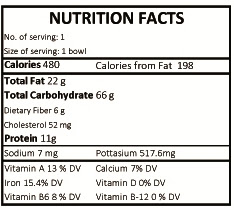 |
| Image source: http://i.vimeocdn.com/video/534355281_1280x720.jpg |
Whole grains have always been a part of the healthy balanced diet but due to all the promotion around gluten-free foods, several believe going gluten free will facilitate weight loss. Let's have a look on what does the science say about this and decide for ourselves if it is a fad, fact, fiction or downright foolishness.
What is gluten?
Gluten is a protein composed of gliadin and glutenin and is primarily found in grains viz. wheat, rye, barley, and triticale. It is often found in hidden form in many other foods, medications, and everyday items and its presence is not limited to bread, cookies, and pasta.
Who should go gluten free?
A strict gluten free diet is only required if you have
- Celiac Disease: A serious autoimmune disorder that affects 1 out of 100 people worldwide.
- Wheat Allergy: Should not be confused with gluten intolerance or celiac disease in which a person is allergic to a specific protein ‘gluten' which is present in wheat and a few other grains. It usually affects children and is outgrown after childhood. It affects 0.1% of the population
- Non-Celiac Gluten Sensitivity: It is a condition characterized by an array of nonspecific symptoms like constipation, bloating, headache etc. after eating gluten. However, there is no hard test as on date ( unlike celiac disease and wheat allergy that can be detected by blood tests) for non-celiac gluten sensitivity and the diagnosis is subjective.
What does the science say about gluten-free diet and weight loss?
With more and more celebrities and weight loss clinics touting the advantages of the gluten-free diet, it is very easy to assume that giving up gluten may lead to weight loss. However, despite all health claims, there is no evidence-based research to support that gluten-free diet is effective for weight loss or necessary if you do not have any gluten-related disorders, according to the
Journal of the Academy of Nutrition and Dietetics.
Many other studies have also reported a gain in weight after following a gluten-free diet. In one such study on 371 adults with celiac disease who followed a gluten-free diet for 2 years, 55 of 67 (82%) initially overweight patients gained weight
1.Another study conducted on 149 children with celiac disease who followed a gluten-free diet for at least 12 months, the percentage of overweight children almost doubled (11% to 21%)
2.
Despite all these studies many still lose weight on a gluten-free diet. Why? Let's find out
4 Reasons why people lose weight when they go gluten-free
- Gluten free diet is restrictive.
- Many high-calorie junk foods like pizza, cupcakes can no longer be eaten.
- Many high carbohydrate foods like bread, pasta can no longer be eaten both as they are not easily available and are expensive.
- Many healthy foods like fruits and vegetables are low in calories and readily available.
Alas!! Shunning off pizzas, kachoris, bhaturas, gulab jamuns, hamburgers, samosas coupled with eating more fruits and vegetables – sounds like a perfect recipe for weight loss. Isn't it??
My Verdict
There is absolutely no need to go gluten free if you are not suffering from any of the allergies gluten or wheat as mentioned above. If your goal is weight loss try to make conscious choices by selecting whole grains, fresh fruits and vegetables and avoiding junk and fried foods. Also, try focusing on portion sizes. a half plate full of salad without dressing, a quarter plate full with protein and the remaining quarter with carbohydrate for lunch and dinner is perfect for weight loss.
References
- Celiac disease and obesity: need for nutritional follow-up after diagnosis. Eur J Clin Nutr. 2010 Nov;64(11):1371-2.
- Overweight in celiac disease: prevalence, clinical characteristics, and effect of a gluten-free diet. Am J Gastroenterology. 2006 Oct;101(10):2356-9.
- http://www.andjrnl.org/article/S2212-2672(12)00743-5/fulltext





